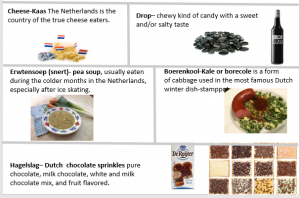Brightlands-Get Out Of The Building 2019
First of all we would like to thank everyone who visited our Cultural Awareness stand at Brightlands’ event “Get Out Of The Building” on Friday, September 20th. We are very pleased if you enjoyed it and moreover if we succeeded in creating more awareness about the Dutch culture.
As promised herewith some information about the statements:
Facts about the Dutch
The Dutch are quite innovative people. Many inventions have been done by the Dutch like the storm umbrella. There are few places in the world more hazardous for umbrellas than the Netherlands, a country under constant assault by stiff winds and pelting rain. Like many Dutch natives, Gerwin Hoogendoorn had grown accustomed to replacing broken umbrellas after storms. He invented the Storm umbrella.
Some other examples of Dutch inventions can be found on https://www.iamexpat.nl/lifestyle/lifestyle-news/10-important-dutch-inventions.
Why are Dutch so innovative? This also has to do with culture. The Dutch ‘like’ to complain but on the other hand they are seeking for solutions.
Cultural behaviour
In general the Netherlands scores high on ‘individualism’ (geert-hofstede.com). An heritage from the 18th century when Calvanism took a strong position in the Netherlands. Therefore the Dutch are ‘carrying’ honesty in their DNA. This leads to the quite direct way of communication. Dutch teach their children to give their opinion and to take initiatives. At school it is common to discuss your results with the teacher if you don’t agree. Nevertheless in general a Dutch is quite unpretentious, if you would give a compliment on his/her car the answer could be something like ‘Oh…I need it for my work’ or ‘Oh..It’s a safe car for my kids’. Next to that Dutch people are precise with respect to appointments; be in time and in general it is not appreciated when you just step by, your Dutch host wants to be prepared for your visit in order to give you a feeling of being very welcome.
Furthermore we would like to pay attention on the use of gestures; your gestures will not always be understood and certainly non verbal expressions are not always noticed. On the other hand be aware a gesture from someone of another culture can have a complete different meaning.
If you want to learn more about how to adequately interact in an international (business) environment, please contact us.
We support professionals to integrate smoothly in the Dutch work culture. We train and coach people who are interacting with different cultures. We maximize employee potential by harmonizing and building on intercultural competences.

